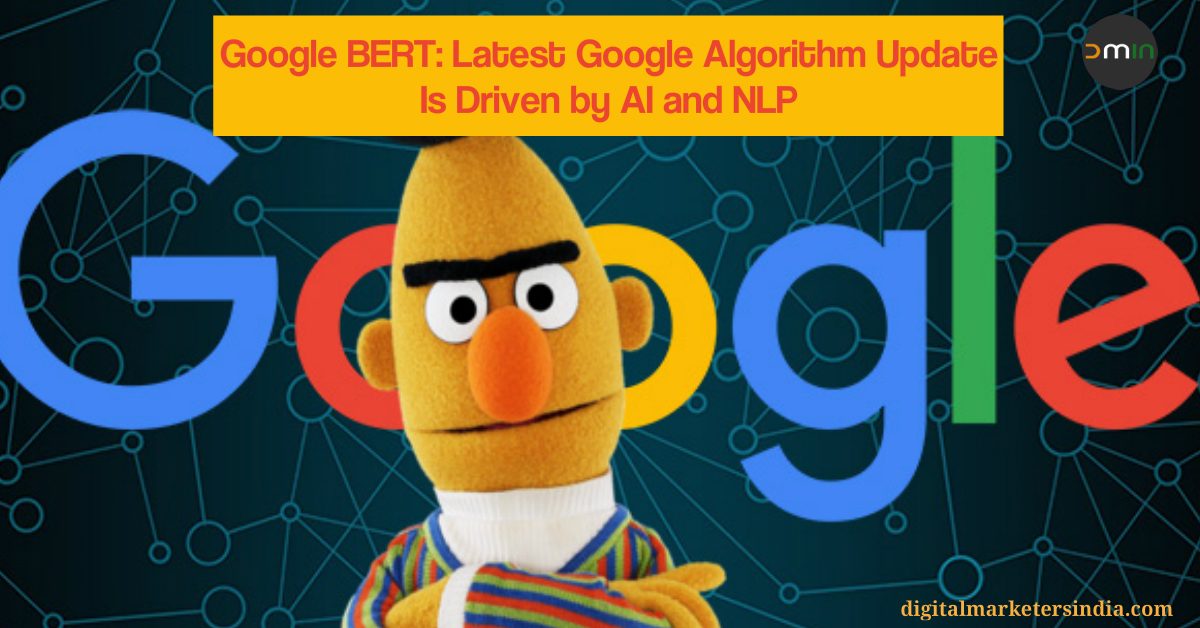Google BERT: Latest Google Algorithm Update Is Driven by AI and NLP

Facebook Will Remove Gray Badge of Verification from Business Pages
October 23, 2019
SEO Trends to Dominate 2020 Define Your SEO Game Now
November 20, 2019It’s not been too long Google had released a core algorithm update, now it has BERT. It can be considered as one of the biggest shifts in the ranking algorithm of Google because it will affect 10% of search queries. Read on to know more about it.
Everyone knows Google is one of the giants that make full use of Artificial Intelligence (AI). The first step taken by Google in this direction was the launch of RankBrain in 2015. It was the first AI-based ranking algorithm launched by Google to serve its users better with the quality and the most relevant search results.
What is BERT?
BERT is the next big move by Google in this direction: Serving searchers with the most relevant and quality results. It uses NLP (Natural Language Processing) and AI to find relevant web pages and provide the most useful search results.
BERT stands for Bidirectional Encoder Representations from Transformers.
Sounds alien language?
Don’t worry, I will simplify it for you.
BERT algorithm focuses on understanding the search queries like humans than a machine to give useful search results.
For example, when someone searches for a keyword “2019 Indian tourist need a visa to travel to the USA”, earlier Google used to show the results, including the webpages that describe a visa process for a USA tourist to India by ignoring “to” in the search query which describes the direction of travel. However, once the BERT is rolled out, it will understand the context and show only relevant results, especially, the process of visa for an Indian tourist that wants to travel to the USA.
Another example is when someone searches for a query, “do receptionists stand a lot at work”. In this case, the earlier algorithm of Google used to show search results related to stand-by and standby words by ignoring the fact that this search query is looking for the job description for the post of a receptionist. This type of query will be better understood and served by the BERT.
What will be affected?
As we all know, Google serves in multiple languages as well as it shows a variety of results such as image search, video search, blog search, so on, so forth. Thus, here comes a question, what will be affected?
To start with, it will affect
- English search queries (web results on desktops and mobile)
- Featured snippet
Later, the BERT Google algorithm will be expanded to other languages and types of search results.
When will it be rolling?
It has already started rolling out in the last week of October 2019. It will take some time in completely rolling out.
Will it replace RankBrain?
As everyone working in the SEO industry knows, RankBrain is the main Google algorithm that shows the search results. The new Google algorithm BERT will not replace RankBrain, but it will complement it.
How? Here is the answer:
The search queries will be treated by RankBrain. However, some queries which cannot be processed by RankBrain in that case, BERT will come into the picture. In simpler language, the queries that have some type of human language, consider a long search query usually typed by not so tech-savvy people, will be served by BERT. The good news is now any mom and pop and even grandma can make a search and get useful results.
Why worry when it is for good?
As you see, the BERT is designed and developed to serve the searchers with useful and relevant results. Then, there is no harm, correct?
Well, not really.
7 out of 10 SEO companies and executives are obsessed with keywords and they stuff keywords in the content so unnaturally that it serves both better and gets ranked on the top. This phenomenon is no longer effective. Even worse, companies that have been raking on the top with these types of SEO strategies are more likely to doom rankings and results from Google search engines. As being said, this latest Google algorithm update will affect 10% of total search queries.
How to know if you are affected?
It is rolling right now so wait for its completion. In upcoming weeks, keep eyes on your visitors’ traffic to see if there is any spike. If you see any spike which can be upwards or downwards, in that case, you are the lucky winner of that 10 % of search queries to be affected.
Can SEO experts do something to create a win-win situation?
According to Google, No, SEO cannot do anything. Google people have been saying this for years. However, the fact is different. SEO experts that know focusing customers into the center can help you create a win-win situation with this algorithm. In fact, the best SEO companies and experts can let businesses pass with flying colors.
What if you do nothing?
There are many companies that anyways do nothing in regard to digital marketing for their own biases and reasons as they don’t have time or digital marketing is not effective or something else. If you are one of them or in some other category, but thinking to do nothing, then don’t worry as you are anyways, not in the game and will be pushed even behind with this advancement in the digital marketing world. You are not losing much, just a few thousands of visitors from all across the globe and a few hundreds of inquiries and a few tens of or maybe hundreds of sales and of course the perks of being a known digital brand.
What should be the next step?
If you are an SEO company or executive, you must redefine your SEO game, especially, content, keywords, etc. to make it more natural and human-friendly. If you are not really aware of this, the next step is finding a trustworthy SEO company to take the command.
We are in this industry for 12+ years and have seen the ups and downs and always got through with flying colors for all our customers. We can help you to take the benefits of this latest Google algorithm and boost your business reach. Contact us for more details.
About Author: Ash Vyas

Ash Vyas has 10+ years of practical experience in digital marketing & international business development. She has written 100s of articles on various topics to live her passion for helping people with her knowledge & expertise. In addition to directing Digital Marketers India, Ash also delivers keynote sessions and holds key positions in some international companies as a consultant, director of operations and mentor.
Twitter | LinkedIn | YouTube | Instagram





